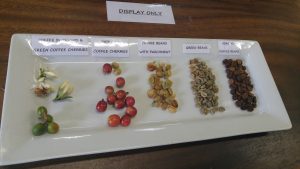Thursday, August 6th, 2020...2:17 pm
The Great Coffee Debate
By: Michelle Bancroft, GradLife Ambassador
“The best part of waking up, is Folgers in your cup!”
Has this been your anthem throughout post-graduate school? I know it has been mine! Also, your welcome, if this is your first time watching this super catchy commercial jingle that has been stuck in my head since 1996! Regardless of how often you sing songs about it your head, there is no doubt that coffee is a popular drink on university campuses, and UofT is no exception.
Almost every café on campus sells coffee, and there are many kiosks and shops just dedicated to a great cup of Joe. However, how much do you really know about it? I am going to explore some fun facts, historic linage, health claims, plus my personal experience about my favourite beverage as we explore the Great Coffee Debate!

According to Jae-Hoon Bae, Jae-Hyung Park, Seung-Soon Im, and Dae-Kyu Song (2014) article Coffee and Health coffee has most likely been consumed by humans for over 1200 years and originated in Africa or the Middle East. Additionally, they found that coffee’s connection to healing has been featured in over 8,000 medical studies in the past 40 years!
My love for coffee has brought me to coffee plantations in Hawaii, Costa Rica, and Colombia to explore how these magical beans are grown and processed. Last year, I did a full day coffee tour in Medellin, Colombia. During this tour I was enlightened by their local coffee experts about the planting, growing, picking, processing, and distribution process of their coffee – it was fascinating! Below are some of my pictures of the experience.

Coffee Drying in Medellin, Colombia, 2019 
Coffee Beans in Medellin, Colombia, 2019

Now that I have fed my curiosity about where coffee has come from, the graduate student inside of me is curious about the reputable research surrounding its health claims. I have chosen to use a well-research article from the Harvard School of Public Health which found that…
“A large body of evidence suggests that consumption of caffeinated coffee does not increase the risk of cardiovascular diseases and cancers. In fact, consumption of 3 to 5 standard cups of coffee daily has been consistently associated with a reduced risk of several chronic diseases. However, some individuals may not tolerate higher amounts of caffeine due to symptoms of jitteriness, anxiety, and insomnia.” (article and reference link)
This article dives in more deeply about each of the health claims for an against coffee, and is a great read for those of you who would like to learn more. For now, I am satisfied that my morning pick-me-up seems to positively contribute to my physical health, as well as the enjoyment I mentally and emotionally get from it.

I hope you have enjoyed this article and will appreciate your coffee a little more from now on!

Leave a Reply